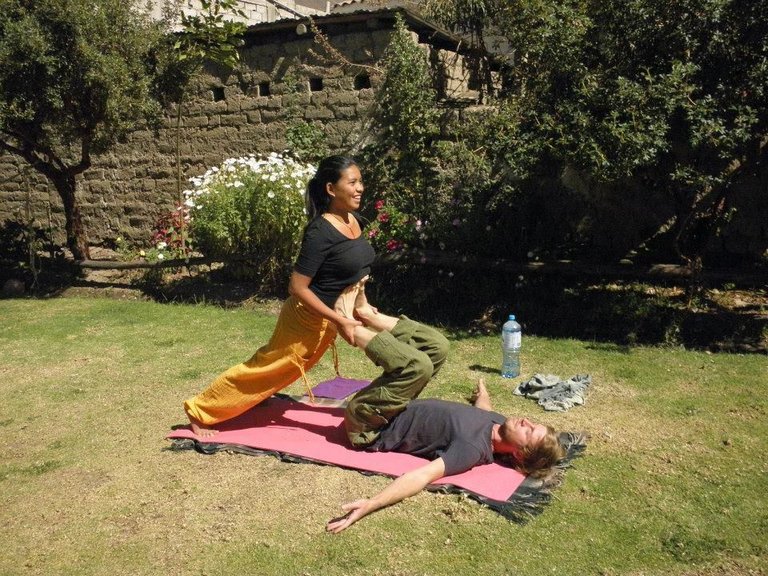These days it might seem like everyone wants to travel the world. But unless you are independently wealthy, who has vacation time to spend months backpacking Central America or motorcycling across Laos?
Enter: long term travel paired with paid (and sometimes volunteer) gigs. Because not everyone with wanderlust has trust fund. Or is an influencer.

Working while traveling is a great way to backpack around the world. Photo credit: Getty.
The idea is simple. Save up enough money to travel long term and then stretch your dollars (and your time off) with jobs as you go.
For this list, I avoided jobs that typically fall under digital nomadism, like financial trading or marketing. Although the ability to work remotely has revolutionized expat life and lead to concepts like crypto nomadism, those kinds of jobs require a different skillset. Being a digital nomad is largely determined by your occupation and if it is possible to work remotely. Instead, I wanted to focus on jobs that anyone could do while traveling or living abroad.
I’ve broken up potential opportunities into two categories: volunteer work where you receive room + board in exchange for labor, and actual jobs that pay you money while you’re traveling long term. This post will focus on work opportunities in exchange for money, while the next will highlight volunteer positions in exchange for room and board.
Making money while traveling the world
Unless you become an influencer or plan on writing a killer blog, not many people are able to travel full time and make good money. You can make decent money along the way to fund additional adventures or spend more time abroad, but you likely won’t be pulling six figures.
But that’s ok. Because sometimes life is about the experience and not the paycheck. And if you’re able to serve beers in Australia for six months to fund a Bali surf trip, it won’t matter that you didn’t pull $120,000 last year.
Teaching English abroad
For native speakers with a bachelor degree, teaching English is one of the easiest ways to work abroad. It offers you the ability to spend a significant amount of time in a country, while (sometimes) making good money.

After teaching English abroad in Martinique, Francesca Murray wrote the first-ever English guide to the island.Francesca Murray.
Francesca Murray, the multimedia journalist behind One Girl One World, moved to Martinique to teach English when she was 27. The gig was meant to be year-long adventure to build content for her blog, but soon snowballed into much more. She is now known as the American expert on the island, and even published the world’s first English language guide to Martinique. She says that teaching English abroad “is an incredible way to fully immerse yourself in a culture .”
The type of work and requirements varies widely between countries and schools. Nearly every reputable job will require a Teaching English as a Foreign Language or TEFL certification course.
Outside of the TEFL certification, requirements vary widely between countries and schools.
For example, Middle Eastern countries like Saudi Arabia or the United Arab Emirates usually require prior teaching experience, while Asian countries like South Korea, Japan and China, mostly do not.
Salaries vary widely depending on what region you’re interested in and your individual background. ESL teachers in Oman report taking home around an extraordinariy $40,000 a year, as income isn’t taxed and housing is provided. Others places like South Korea or Japan offer a low cost of living and high salaries, so English teachers there have been able to save thousands a year. On the opposite end of the spectrum, teachers in European countries like Czech Republic, Italy or Spain report salaries that cover expenses, but not much else.
Use websites like Dave’s ESL Cafe, Transition’s Abroad, Serious Teachers or Tefl.net to find a job teaching English abroad. More resources include teacher Nicole Brewer’s book on the subject and Nomadic Matt’s list of best places to teach English overseas. Experts also recommend looking on Facebook for ESL teacher groups in your intended country.
If the idea of trolling message boards or finding individual schools to apply to is exhausting, consider using a recruiter. They will match your requirements (salary, location, benefits) with appropriate schools. Usually, schools pay the recruiters’ fee so it isn’t an additional cost.
Although in general people have good experiences with these kinds of programs, there are some bad actors. Check with current teachers and read school reviews online before committing to anything. Read the fine print in a contract, as any vagueness will usually be interpreted in the school’s best interest. You’re likely less aware of local work culture, so it’s important to ask questions before you arrive.
Former teachers also caution against any school that asks for money before you arrive. This is a job and you should not have to pay for that opportunity. Other red flags include programs that require you to work on a tourist visa, and don’t offer benefits like a flight home, a housing allowance or medical benefits.
Working Holiday visa
If you want to spend significant time working abroad, but aren’t interested in teaching English, a working holiday visa program is a great option.
Working holiday visas “are the easiest way to experience a new culture,” said Tommy Walker, the British travel blogger behind The Wandering Walker. During his twenties, he lived in New Zealand, Australia and Hong Kong thanks working holiday visa programs. “You get to earn money, travel to a new place and save for a new adventure.”
Depending on your nationality, and age, the program allows you to live in a foreign country, and work a nonprofessional job like bartending for a set amount of time, usually between six to 24 months. An added benefit is that (usually) you can stay in one country much longer than if you entered with a normal tourist visa.
Participating countries view the program as a way to encourage longer term tourism while promoting cultural awareness. If you are unsure of your intended career path, or just want a break from the typical grind, a working holiday visa is a great way to move abroad and make money. Applicants usually must be between 18 to 30 years old, although each country has its own guidelines.
Logistics of the program varies widely depending on your own nationality, as well as the country you wish to travel to, so do your homework beforehand. Unfortunately, since the United States does not offer a working holiday visa program of its own, many countries do not offer Americans this visa. For now, Americans are limited to Australia, Ireland, New Zealand, Singapore and South Korea.
Hustle
Finding odd jobs in a foreign country is much more intrepid than a working holiday visa or becoming an ESL teacher. And while the path isn’t as clear – there’s no book on how to convince a hostel owner that they really need your artistic expertise – it can be very rewarding.
Long term backpackers turned liveaboard luxury yachters Kach and Jonathan Howe spent years exploring Central America and Asia. Although the Filipina and British couple now are in a different life stage – the one where you live on a luxury yacht – there was a time where they hustled for their adventures, picking up odd gigs as they traveled across continents.
Blogging about their adventures on Mr & Mrs Howe, the pair boasts a gamut of jobs from their backpacking days, from teaching English to waiting tables to managing social media for hostels. After years of slow travel, their biggest piece of advice is that you should invest in new skills if you want to travel and work at the same time.

Teaching yoga in South America funded Kach and Jonathan Howe's long term travel.Kach and Jonathan Howe.
“Working, volunteering, or joining a workaway program… is a great way to get deeper into a place,” says Kach Howe, 30. By engaging with the local economy, Howe says that she and her hubbie ended up staying longer in places than expected, meeting new people and “finding out about things that we might otherwise have breezed through having only seen a handful of highlights from the guidebook!”
While traveling around South America in 2014, they relied on yoga and massage to fund their journey, as teaching English was not very lucrative. Sticking to bigger cities where they could more easily break into a market, the pair made their way around the continent, relying on their Tantra Yoga and Ayurveda massage certifications to help bring in business.
Warning! This user is on my black list, likely as a known plagiarist, spammer or ID thief. Please be cautious with this post!
our discord. If you believe this is an error, please chat with us in the #cheetah-appeals channel in